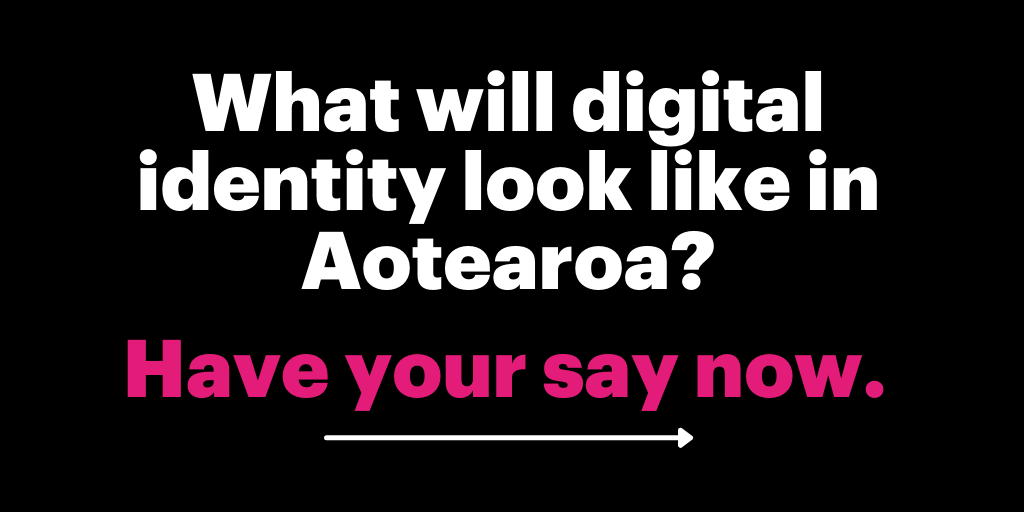Have your say: digital identity for Aotearoa
Submissions closed: 2 December 2021
Link to InternetNZ's submission
What is digital identity?
Activities like opening a bank account, buying a bottle of wine, or boarding an international flight often require people to show identity documents like a driver’s licence or passport. Digital identity means using digital systems, instead of physical documents, to prove facts about a person’s identity.
What is this law change on digital identity about?
The Digital Identity Systems Trust Framework Bill proposes new rules to regulate and enable the use of digital identity systems in New Zealand. The Bill is being considered by Parliament through the Economic Development, Science and Innovation Committee, and submissions are open until 2 December.
Why does it matter?
As banks, retailers, and other organisations start using digital identity over the coming years, these systems will become important for daily life in New Zealand. One example is the government’s My Vaccine Pass system, which will be used to let people show their vaccine status without sharing extra personal information. This will enable venues like gyms and restaurants to open while reducing COVID-19 risks.
This Bill sets key legal rules for digital identity in New Zealand. We think it’s really important to ensure these rules are designed in a way that upholds people’s trust, allows problems to be fixed over time, and ensures systems work for everyone.
Overseas digital identity systems give rise to big human rights problems
Overseas digital identity systems have created serious human rights concerns, by amplifying social and digital exclusion, through solutions not designed to be accessible, affordable, usable, culturally appropriate, and creating new harms around privacy, consent, individual agency and civil liberties.
The Engine Room conducted a multi-country study in 2020 to understand the lived effects of Digital Identity. Across five countries they found problems from a failure to consider local context, and low levels of public and civil society involvement.
What does the Bill propose?
The Bill sets out a framework for accrediting providers of digital identity services. Accredited providers will have to follow rules under the trust framework, and can use a trust mark to tell consumers they are accredited (similar to the Heart Foundation Tick). The Bill also sets up a Trust Framework Board to recommend rules and oversee the system, a Māori Advisory Group to advise the Board, and a Trust Framework Authority to run the accreditation process and regulate providers. Criminal penalties apply to improper trust mark use or claims to be accredited.
What will InternetNZ be submitting on?
InternetNZ will be submitting on the Digital Identity Systems Trust Framework Bill. We strongly support the goal of a framework designed to be safe and trustworthy for everyone in New Zealand. Our key concerns are doing what’s necessary to build that trust with people, and ensure the system upholds that trust over time.
Reconsider the purely voluntary nature of the trust framework
The Bill proposes a voluntary, opt-in accreditation framework for digital identity. We think that some general rules should apply to all digital identity systems, to ensure systems outside the framework are also safe and do not undermine trust, similar to the rules for giving financial advice in New Zealand.
Ensure the design of digital identity systems considers people’s diverse needs
Over time, we expect digital identity systems will be part of how people access banking, retail, and other services vital to full participation in the community. It is vital that these digital identity systems include everyone. We think the Bill should require a design process to ensure these systems meet diverse people’s needs.
Make community consultation and accountability a foundation of the system
To ensure the systems consider people's diverse needs, community engagement is necessary. We will recommend that private and public organisations involved in digital identity start incorporating this practice and sharing their learnings with their peers. InternetNZ may be in a position to share some research on this by March 2022.
How can you have your say?
Submissions on the Digital Identity Systems Trust Framework Bill close on 2 December. You can put in a written submission through the Parliament website. Even a short submission can be useful, and you can say you want to speak to the committee when they meet next year.
Want to read more?
Some useful resources on the Bill, and digital identity in general are:
- Parliament’s Bill Digest, which offers a useful summary of the Bill
- Reports by the Engine Room on overseas digital identity systems and how they affect people’s lives
